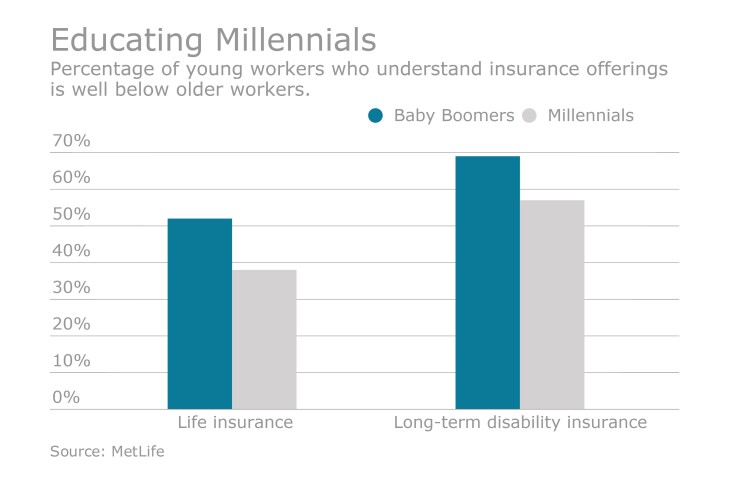“If you want to have a high paying job, you need to have a college education.” Many millennials have had this statement burned into their brains for years. Now, with college degrees at a premium, many of those same millennials are entering the workforce with tens of thousands of dollars in debt already strapped to their backs.
Seventy-three percent of millennials (those born in 1982 or later) are concerned about meeting their monthly living expenses and financial obligations, compared to 67% of Gen X and 63% of baby boomers, according to MetLife’s most recent Employee Benefit Trends Study. This has led many employers to seek out alternative benefit programs that will assist with the modern day problems millennials are facing, which in turn will attract and retain young employees.

Debilitating debt
Jeff Oldham, VP of consumer strategy of the Benefitstore at Benefitfocus, says the level of debt millennials are being burdened with when entering the workforce is seriously affecting their life-changing decisions, such as buying a home or starting a family.
“Most employers want to offer the ability for their employees to interact with a financial tech company such as SimpleFi, SoFi,” Oldham says. “Employers want their millennials to 1) be able to refinance their student loans and 2) they want folks to have access to online and telephonic financial education and counseling tools.”
Oldham has seen several companies offer loan assistance benefits that will assist employees with student loans by paying off a percentage of their loans based on the amount of time they remain with the company.
Also see:
“Let’s say in year one the company will pay X% and in year two the company will pay Y%, and they‘ll continue to contribute,” he says. “So if I was millennial just coming out of school, I would be asking the question when interviewing, ‘What kind of student loan programs do you offer?’”
Carlos Hernandez, VP of strategic alliances with Acclaris, says the main thing employers need to keep in mind when offering these benefits is to just keep it simple. “Employers are trying to structure programs with more instantaneous values,” Hernandez says. “A benefit program like an HSA is a great one because it will support someone who is 20 years old and just graduated and somebody who is 60 years old and is ready to walk out the door.”
Better understanding
A common problem millennials have reported encountering is not understanding the benefits being offered to them and how important they might be to their future. According to MetLife’s study, 52% of millennials understand life insurance, compared to 69% of boomers, and more than one-third of millennials don’t understand their basic medical coverage.
An option Hernandez has seen employers use is inviting a financial planner into the office to give a brief presentation on what employees should be investing their money into when prioritizing their finances.
“Employers want to educate you and understand the value of benefits like a health savings account,” he says. “There are tax advantages to putting money in for the short term for a long-term product.”
Oldham says to simplify medical benefit decisions for millennials, employers are expected have the same options across all industries, so no matter where someone goes the decision will be completely streamlined.
“The majority of employers that I speak to recognize that regardless [of the Cadillac tax], within the next 10 years all employers are going to have very similar medical plans,” Oldham says. “What employers used to utilize, which was their medical coverage to recruit new employees, will be so similar across the board that they will need to find new ways to recruit.”
Oldham adds that this is why financial wellness has become such a strong topic when handling millennials, because employers are looking at this benefit as a key part of recruitment and retention.
Both Oldham and Hernandez say millennials will be changing not just what benefits are being offered to recruit new talent, but also how workplaces operate such as open floor office spaces and working from home.
“The word the tech companies are using is ‘collaboration,’” Hernandez says. “I think many businesses understand that the traditional workplace does not happen as much as they used to and companies are trying to make the workspace more comfortable for everyone.”





